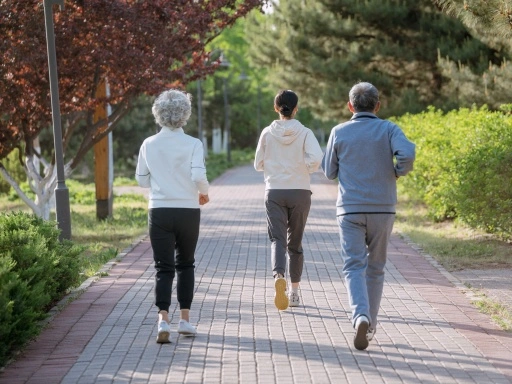Jun 20 2024
When aging in middle age is underway, anti-disease and anti-aging to catch 3 age points
New research published in the journal Nature Medicine shows that there are three variable speed gears of aging in the human body, namely 34, 60 and 78 years old. Researchers at the Alzheimer's Disease Research Center at Stanford University analyzed plasma data from 4,263 subjects aged 18 to 95 years old, and after determining the levels of about 3,000 different proteins, they found that the protein levels remained relatively stable overall, but that readings of a variety of proteins changed considerably at the three ages mentioned above. The researchers explained that these changes in protein levels are not only characteristic of human aging, but may be the cause of aging. "As the research continues, we expect to be able to measure human aging at the molecular level through blood tests." Professor Tony Wise-Corey, who led the research, said, "The more we know about age, the more we can intervene. In the future, it is possible that we will know exactly what diets and behaviors contribute to a longer life, thus helping people avoid developing various diseases." While aging is inevitable, what can we do to slow its process? Join us to find out.
At 34, health shifts from peak to downhill
Aging and disease in the human body are overall changes caused by cell damage or death. As early as 1925, Wilson, a famous American biologist, proposed, "The key question of all life is to be found in the cells." Niu Wenyi, professor of the Department of Social Medicine and Health Education at Peking University School of Public Health, said that although young people are in the stage of youthfulness, relative maturity and stability of the body and mind, the number of cells in the body and the water in the cells began to decrease continuously, which is the first turning point of the aging of the organism. Liu Dequan, former director of the Department of Traditional Chinese Medicine at the Beijing Geriatric Hospital, mentioned that most people around the age of 34 are in a state of heavy family burdens, high work pressure and complicated interpersonal relationships, which largely affects their physical and mental health, and that these external factors are causally related to the sudden change in protein readings in the body mentioned in the study.
Experts believe that people in their 30s should focus on the health of the nervous system and musculoskeletal conditions. after the age of 30, blood circulation in the brain slows down, blood flow decreases, and the number of nerve cells in the brain gradually decreases, which affects memory, coordination, and brain functions. Human muscle mass reaches its peak at the age of 25 to 30, and then gradually decreases with age, which in turn affects the body's metabolic rate, and around the age of 35, bone loss begins. 30 years old, the heart's ventricular walls and valves will gradually thicken, and the cardiac conduction system begins to age. At the same time, lung capacity also begins to decline slowly. Yang Ping, secretary-general of the Geriatric Psychology Branch of the Chinese Society of Gerontology and Geriatrics, told the reporter that people around the age of 34 are prone to anxiety, depression and other psychological problems due to the increase in pressure and responsibility.
Liu Dequan reminded that with the change of people's life style and dietary habits, some chronic diseases in old age, such as hypertension, diabetes, atherosclerosis, etc., are more and more occurring in the young and middle-aged people, at the same time, long-term fatigue state also increases the risk of chronic fatigue syndrome and obesity in them.
At 60 years of age, all functions are in old age.
Around the age of 60, people are at the end of menopause, and facing retirement, a change in the state of life, these factors together lead to accelerated aging.
Liu Dequan said that this age group should focus on the circulatory, digestive and immune systems. 60 years old, the cardiac output per beat (refers to a heart beat, one side of the ventricle ejection of blood) compared to the age of 20 years old 30% to 40% reduction in the cardiac conduction system continues to age, easy to lead to the body's insufficient blood supply and compensatory disorders and other problems. In terms of digestion, around the age of 60, the oral cavity, esophagus, gastrointestinal function gradually declines, the pancreas due to lipid infiltration and glandular cell atrophy, resulting in a decrease in secretion and activity of digestive enzymes such as trypsin, lipase, etc., the digestive function declines, and the risk of gastrointestinal disorders increases with it. Endocrine system aging is mainly reflected in the levels of various hormones and the sensitivity of target organs to it. A ten-year study published in the journal "Aging" shows that with age, the total number of T-lymphocytes in the body continues to decrease, and the immune function decreases, making it more susceptible to bacterial and viral attacks.
Psychologically, due to the gradual decline in physical function and the change in social function caused by retirement, people around 60 years old are prone to psychological gap, which will also accelerate aging. Yang Ping also mentioned that more than half of the people over 60 years old have worries and insecurity about their own health, which aggravates their psychological burden and is more likely to lead to emotional instability, anxiety, depression and other psychological problems.
78 years old, rapid aging of systems, organs
Around the age of 78, all human functions enter a phase of rapid aging, with obvious changes in various systems such as the nervous, urinary, respiratory and circulatory systems, as well as cognitive and psychological.
In the nervous system, the number of brain cells and synaptic connections in the elderly decreases, and cerebral blood flow decreases, leading to memory loss, easy fatigue, and slow response to the outside world. In the urinary system, renal arteriosclerosis and reduced renal blood flow can lead to reduced renal function. Elderly men are often accompanied by prostate hyperplasia, with frequent urination, urinary urgency, and a sense of incomplete urination; elderly women tend to experience urinary incontinence due to the relaxation of the pelvic floor sphincter. As for the respiratory system, the elderly will have problems such as decreased strength of respiratory muscles and calcification of the trachea, resulting in increased airway resistance and decreased lung ventilation and lung ventilation. With the weakening of cilia movement, the ability of the elderly to expel sputum also gradually declines. As for the circulatory system, the thickening of the ventricular wall and the hardening of peripheral arteries in people around the age of 78 are more likely to cause ischemia in the organs.
Brain function declines and cognitive deterioration is very pronounced in the elderly at this stage.In 2018, a study presented at the annual meeting of the Population Society of America showed that brain aging results in a period of about four years of partial cognitive impairment from the age of 73 years onward, followed by a year-and-a-half to two years of the possibility of Alzheimer's disease or similar cognitive impairment disorders. On the psychological level, older people often exhibit personality disorders such as self-centeredness, conservatism, suspiciousness, impatience, low self-esteem and psychological problems such as empty nest syndrome.
The best way to fight aging: exercise!
A new study published in the journal Aging Cell shows that regular exercise is the best option to fight aging.
In this study, the research team evaluated 84 male and 41 female cyclists, aged 55 to 79. How were they defined as cyclists? Men could ride 100 kilometers in 6.5 hours and women could ride 60 kilometers in 5.5 hours.
It was found that compared to those who did not exercise regularly, these cyclists did not lose muscle mass or strength with aging, did not increase body fat or cholesterol levels, and had immune systems as strong as those of younger people.
Not only that, but the cycling men had higher levels of testosterone.
The researchers concluded that infrequent exercise has a significant contribution to immune system aging as we age.
The U.S. National Institute on Aging categorizes exercise into four basic types: endurance, strength, balance and flexibility. They recommend not limiting yourself to one type of exercise, and mixing it up not only enhances the fun but also reduces injuries.
Endurance exercise, also known as aerobic exercise, enhances breathing and heart rate, which is good for heart, lung, and circulatory health. Increased endurance can make daily activities easier. For example, walking or jogging, dancing, etc.
Strength exercises, also called resistance training, build muscle and make you stronger. For example, lifting weights, using resistance bands, and using your own weight (pull-ups).
Balance exercises prevent falls, and some lower body strength training improves balance. For example, standing on one foot, walking on tiptoes, Tai Chi, etc.
Flexibility exercises stretch your muscles, favoring a more supple and agile body and allowing you to move more freely in your daily activities. For example, calf stretching, yoga, etc.


